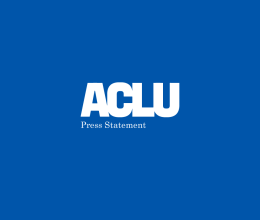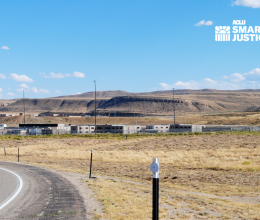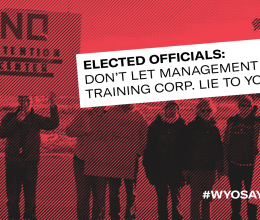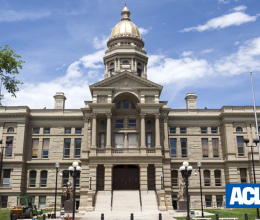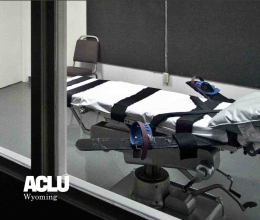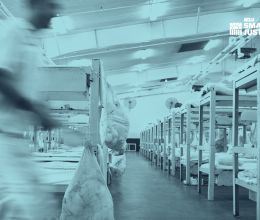
Wyoming can cut incarceration in half and save millions of dollars by pursuing reforms to different areas of the criminal legal system, according to the ACLU of Wyoming’s newly released Blueprint for Smart Justice report.
The report highlights sensible reforms that, if implemented, would mean 1,528 fewer people in the state’s prison system by 2025, saving taxpayers more than $166 million that could be invested in schools, services and other resources that would strengthen communities.
Among the proposed reforms is expanding access to mental health and addiction treatment in Wyoming.
Mental health diversion is an effective way to redirect people out of the criminal legal system and into supportive community treatment. Current mental health diversion efforts in Wyoming, however, have proven ineffective because of a lack of adequate upfront funding. Similarly, substance use disorders are often underlying drivers of a substantial number of crimes. Addressing substance use through treatment rather than incarceration can more effectively reduce crime.
One way to support both mental health and substance use treatment options is by expanding Medicaid, giving Wyomingites greater access to treatment while on community supervision and after release from the criminal system.
“Wyoming taxpayers are footing the bill for a bloated prison system that has failed to make us safer,” said Heather Smith, executive director for the ACLU of Wyoming. “This blueprint bolsters the case for a bold, forward-looking reform agenda that will prioritize people and not prisons, enhance safety and help people live law-abiding lives. Real criminal justice reform like this will require leadership and commitment from our legislators, police, district attorneys, judges, and people in each part of the system, and it’s our hope that this blueprint will help inspire and guide this much-needed reform.”
Other reforms in the ACLU’s report include:
- Advocating for a restorative justice model for the wider criminal justice system
- Expanding probation as the presumptive punishment for certain crimes
- Prohibiting incarceration in cases of technical violations of parole and probation
- Reducing reliance on cash bail and creating a fairer, smarter pretrial system
The Blueprint for Smart Justice report includes an overview of Wyoming’s incarcerated populations, including analysis on who is being sent to jail and prison and the racial disparities that are present, what drives people into the system, how long people spend behind bars, and why people are imprisoned for so long. It also offers a calculation on the impact of certain reforms by 2025 on racial disparities in the prison population, fiscal costs, and progress toward a 50 percent decarceration goal.
The report is a part of the ACLU’s Smart Justice 50-State Blueprints project, a comprehensive, state-by-state analysis of how states can transform their criminal justice systems, and is the result of a multi-year partnership between the ACLU and the Urban Institute to develop actionable policy options that capture the nuances of local laws and sentencing practices.
An interactive website presents the reports and allows users to visualize the reductions in jail and prison populations that would result from the policy decisions. The Wyoming report can be found at https://50stateblueprint.aclu.org/states/wyoming/.
About the ACLU of Wyoming
The American Civil Liberties Union of Wyoming is a non-partisan, nonprofit organization dedicated to the preservation and enhancement of civil liberties and civil rights. The ACLU of Wyoming is part of a three-state chapter that also includes North Dakota and South Dakota. The team in Wyoming is supported by staff in those states.
The ACLU believes freedoms of press, speech, assembly, and religion, and the rights to due process, equal protection and privacy, are fundamental to a free people. In addition, the ACLU seeks to advance constitutional protections for groups traditionally denied their rights, including people of color, women, and the LGBT communities. The ACLU of Wyoming carries out its work through selective litigation, lobbying at the state and local level, and through public education and awareness of what the Bill of Rights means for the people of Wyoming.
###
